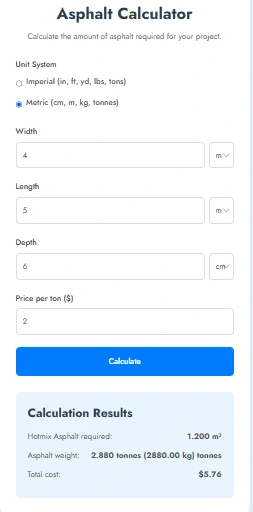Asphalt Calculator | Estimate Asphalt Volume, Weight & Cost Accurately
Asphalt Calculator
Calculate the amount of asphalt required for your project.
Calculation Results
When you are planning an asphalt paving project, whether it’s for a driveway, road, or parking lot, it is important to have an accurate estimate of how much asphalt you will need. In turn, an asphalt calculator will make this process much more comfortable by calculating the required material according to the area dimensions and thickness. By using an asphalt calculator, you will ensure to use the correct amount of your asphalt mix without any waste and at a cost-efficient manner, improving your project planning.
Understanding Asphalt Measurements
There are several measurements which are important to asphalt calculations, so it’s important to understand these when using an asphalt calculator:
- Square footage (SF): Area to be paved.
- Thickness (inches): How thick the layer of asphalt is.
- Volume (cf or yd3): Total material needed.
- Density (pounds per cubic foot or ton per cubic yard): The typical asphalt density is approximately 145 lbs./cu. ft. or 2,000 lbs./ton.
How an Asphalt Calculator Works
To use an asphalt calculator you need three main inputs:
- Step 1: Measure Length and Width: Measure the area to be paved in feet.
- Thickness: Key in the desired asphalt thickness in inches.
- Density Factor: Generally fixed at 145 lbs/ft3 but can be altered for differing conditions.
Benefits of Using an Asphalt Calculator
- Accuracy: Minimizes estimation errors in material quantities.
- Cost Savings: Avoids unnecessary spending or material shortages.
- Time Saving: Reduces time in planning and execution.
- Less Waste: The environmental benefits of plant-based eating
Tips for Effective Asphalt Estimation
- Compaction: Asphalt will compact 5-10% after rolling; ensure that this is included in your calculation.
- Round Up: Round up in order to prevent supply shortages.
- Check Local Supplier Standards: Asphalt density varies depending on mix and supplier specifications.
- Do not forget if it is too cold; you can need a warmer layer that can endure.
How to Calculate Asphalt Calculator?
First get the area (length x width) then multiply by desired thickness (in feet) then multiply by density of asphalt (approx 145 lbs/cubic foot) and then convert the final weight to tons.

FAQSs
Conclusion
If you’re involved with paving projects, an asphalt calculator will be a crucial tool for contractors, homeowners, and engineers. It enables you to budget, manage resources, and implement when you have precise material estimates. No matter if you are working on a small driveway or large commercial lot, using an asphalt calculator will help save time and money, and increase the accuracy of your project. Get an accurate asphalt calculator and begin planning your project right now!
